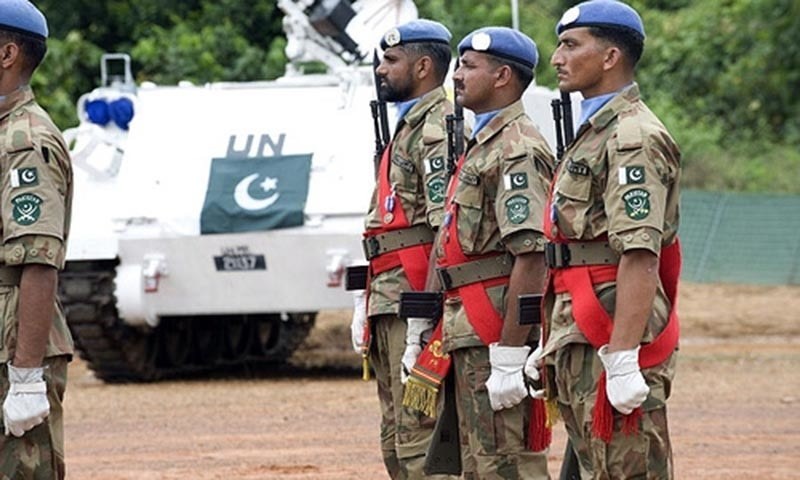
Source:AFP
Tughral Yamin
In the age of imperialism, the British colonist took a lot of Indian labour with them to Africa for developing infrastructure and settling the areas under the control of their empire. In the process, many businessmen and government contractors from the area that now constitutes Pakistan made Africa their home. These people migrated with their families to places like Kenya, Ghana, Malawi, and Tanzania. They mostly resided and still live in main cities of East Africa particularly Nairobi, Dar es Salaam, Zanzibar, Mombasa, Kampala. They can also be found in smaller urban centres and in the remotest of rural townships, playing leading social and economic roles in businesses, manufacturing and the service industry, and make up a large proportion of the liberal professions. South Africa also has a significant South Asian population.
The migrants from South Asia took their culture and cuisine to remote corners of Africa, where it took roots and still flourishes at some places. Many expatriates in South Africa run spaza or barber shops. Johannesburg’s Fordsburg is said to be among the best places to find Pakistani food. The influx of people arriving from Pakistan has increased significantly in the last ten years. Most of them are in grocery, electronics and cell phone businesses. They are also importing Japanese cars and selling them in Durban. Many Pakistanis are working in the field of medicine throughout the country. Unfortunately, it is sometimes alleged that various Indian and Pakistani crime syndicates are involved in drug smuggling. South Asians are also sometimes scapegoated by the local population, who find it difficult to compete with them in the domestic market e.g. in February 2010, a crowd of angry rioters protesting unemployment issues burnt tyres and barricaded roads in a northern township in Johannesburg. Local media reported that Pakistani shopkeepers were among those whose premises were looted. To protect their interests, Pakistanis have established the Pakistan South Africa Association. This is a very effective organisation and represents Pakistanis all over South Africa. It has 16 units which operate its offices from all provinces and has the central executive office in Pretoria.
When Pakistan became independent, Africa was also coming out of the colonial yoke. There was hope and promise and many enterprising young people moved to Africa in search of new and possibly better lives. The Europeans were departing and educated people from Asia and elsewhere were stepping into the space created by their departure. This trend to move to Africa, however, never achieved the momentum of the mass exodus that would later symbolise the ‘Dubai Chalo’ phenomenon.
Africa is a vast continent with lots of mineral resources and huge potential for business. In fact one of the reasons for conflict in Africa today is because many countries, for instance, the Democratic Republic of Congo (DRC) have lots of resources. Minerals extracted in conflict zones are known as ‘conflict minerals.’ The four most commonly mined conflict minerals in DRC are tin, tungsten, tantalum, and gold ore or 3TG. These are extracted in eastern Congo, and passed through a variety of intermediaries before being purchased sometimes by unscrupulous buyers.

Since there is conflict and turmoil in Africa, there is foreign intervention in the form of UN peacekeeping forces. Pakistan’s footprint in Africa today is in the form of boots on ground. Since Pakistan sent nearly seven thousand soldiers to Somalia in 1992, Pakistan has become one of the largest troop contributing countries in the world. As of 31 December 2018, Pakistan has more than 6000 troops deployed in international conflict zones. This includes missions such as UNO Stabilization Mission in the DR Congo (MONUSCO), UN Hybrid Operation in Darfur (UNAMID), UN Integrated Peacebuilding Office in the Central African Republic (MINUSCA), UN Mission for the Referendum in Western Sahara (MINURSO), UN Mission in South Sudan (UNMISS), UN Multidimensional Integrated Stabilization Mission in Mali (MINUSM), UN Assistance Mission in Somalia (UNSOM), UN Mission for Justice Support in Haiti (MINUJUSTH), and United Nations Peacekeeping Force in Cyprus (UNFYICYP).

Our professionally competent peacekeepers present the best face of their country in Africa. Since they are engaged in nation building tasks like building schools, roads and bridges, their work and expertise have become well known. However, there is a lot of scope of expansion and collaboration in a number of other areas as well. Africa needs trained manpower such as school teachers, bankers, doctors, nurses and miscellaneous service providers. China is massively investing in infrastructure. Other countries including India are not only leasing oil blocks for exploration but also buying large tracts of lands to grow crops to supplement their indigenous agricultural produce. The land grab in Africa has assumed epidemic proportions.
Africa is an area that has been least explored by the government of Pakistan. It is time that the policy makers adopt an outreach approach to friendly governments in Africa. A wholesome Africa policy should aim to capitalize on the goodwill generated by the peacekeepers. Entrepreneurs should be facilitated to start businesses and engineering firms should be encouraged to develop infrastructure in the emerging countries of Africa. Farm leases with imported farm hands from Pakistan can also help improve our food security.
Dr.Tughral Yamin is Associate Dean, Center for International Peace and Stability, National University of Science & Technology, Islamabad.




